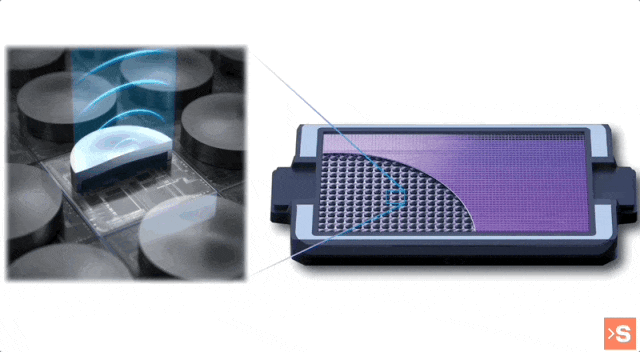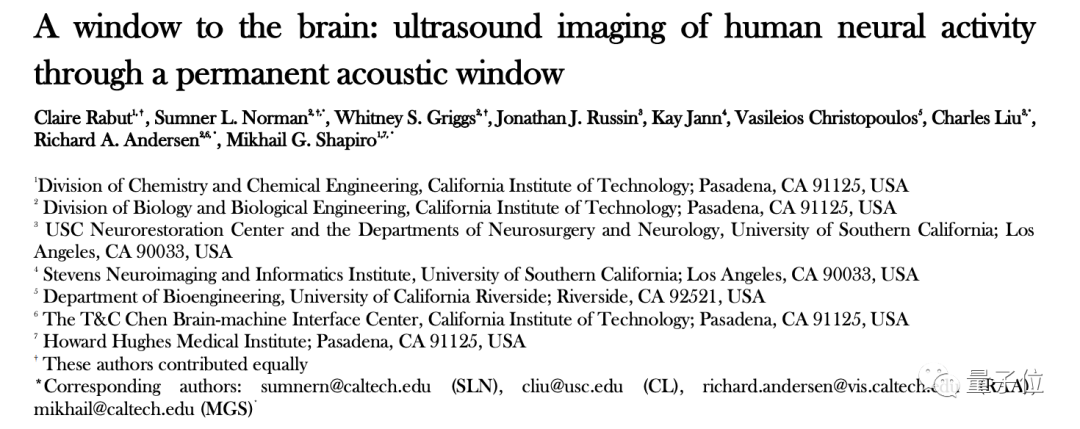 Technology peripherals
Technology peripherals
 AI
AI
 More accurate and minimally invasive than Musk's brain-computer interface, the ultrasound brain reading method is here
More accurate and minimally invasive than Musk's brain-computer interface, the ultrasound brain reading method is here
More accurate and minimally invasive than Musk's brain-computer interface, the ultrasound brain reading method is here
There is new news coming out of the brain-computer interface track.
IEEE Spectrum news, a new minimally invasive ultrasound brain-computer interface device is under development.

This device changes the traditional brain-computer interface medium EEG to ultrasound.
The principle is to use direct focused ultrasound (FUS) to change the action potential of neurons, using a technology called Functional Ultrasound Imaging (fUSI), through the Doppler effectMeasure local blood flow changes to monitor neural activity within brain regions.
Medical technology company Forest Neurotech and medical imaging company Butterfly Network have reached a cooperation on the development of this minimally invasive ultrasound brain-computer interface device.
In terms of developing brain-computer interfaces, Musk's Neuralink, Paradromics and Synchron and other companies are all working hard to "electrically" interact with the brain
In comparison, ultrasound-based brain-computer interfaces What are the advantages of interfaces?
The "wound" is smaller and the spatial positioning is more accurate
According to reports, traditional brain electrical stimulation technology is highly restricted in space due to the limited propagation distance of current in brain tissue. According to the above, traditional brain electrical stimulation technology is greatly restricted in space due to the limited distance that electric current propagates in brain tissue. Therefore, when stimulating deep areas of the brain, it is necessary to invade through
Sexual SurgeryPlace electrodes in relevant locations. And simply installing deep implants or electrodes in the skull can only record neural activity in superficial areas of the brain. To this end, the development team stated that it is developing a minimally invasive ultrasound implant. It only needs to be implanted into the user's skull and placed on the surface of the brain to use ultrasound to flexibly stimulate and record specific areas of the brain. Neural activity, and the accuracy is
sub-millimeter level.
 Specifically, Butterfly Network provides ultrasound chip hardware support, and Forest Neurotech uses these ultrasound chips to stimulate specific areas of the brain through guided and focused ultrasound waves.
Specifically, Butterfly Network provides ultrasound chip hardware support, and Forest Neurotech uses these ultrasound chips to stimulate specific areas of the brain through guided and focused ultrasound waves.
 Next, use functional ultrasound imaging (fUSI), a neuroimaging technology, to monitor neural activity
Next, use functional ultrasound imaging (fUSI), a neuroimaging technology, to monitor neural activity
The principle of fUSI is also very simple:
Like all cells, neurons require blood to function, and an increase in the "activity" of neurons means that the blood flow supply required by the brain also increases.
fUSI uses ultrasound to detect small changes in blood flow in the brain to infer the activity level of neurons
The specific method is to emit ultrasound waves to a certain area of the brain and then detect its "echo" ( That is, reflected waves affected by blood flow) to achieve
Since blood will cause the "Doppler effect" when it moves, it will slightly affect the vibration frequency of the echo.
By analyzing changes in echo frequency, the fUSI system can infer changes in blood flow velocity, thereby inferring neural activity in the area
Company Profile
It is reported that this The first ultrasound brain-computer interface device will be jointly developed by Forest Neurotech and Butterfly Network.
Forest Neurotechis a non-profit organization just established in January this year, focusing on the development of minimally invasive ultrasound brain-computer interfaces. The co-founders are Sumner L. Norman, Tyson Aflalo, and William Biederman.
 The fUSI technology mentioned above is a research that CEO Sumner L. Norman recently participated in.
The fUSI technology mentioned above is a research that CEO Sumner L. Norman recently participated in.
 In addition, Forest Neurotech is a subsidiary of Convergent Research, which is a scientific non-profit incubator and a member of the Schmidt Futures Network. It was announced some time ago that it has received 5,000 $10,000 in new philanthropic support.
In addition, Forest Neurotech is a subsidiary of Convergent Research, which is a scientific non-profit incubator and a member of the Schmidt Futures Network. It was announced some time ago that it has received 5,000 $10,000 in new philanthropic support.
is a medical imaging unicorn company founded in 2011 by Jonathan Rothberg, known as the "Jobs of biotechnology." Butterfly Network previously developed Butterfly iQ, the first handheld single-probe whole-body ultrasound system built using ultrasound chip technology
Currently, Forest Neurotech has reached a 5-year joint development agreement with Butterfly Network , Forest will pay US$20 million to purchase Butterfly ultrasound chips and services.
The above is the detailed content of More accurate and minimally invasive than Musk's brain-computer interface, the ultrasound brain reading method is here. For more information, please follow other related articles on the PHP Chinese website!

Hot AI Tools

Undresser.AI Undress
AI-powered app for creating realistic nude photos

AI Clothes Remover
Online AI tool for removing clothes from photos.

Undress AI Tool
Undress images for free

Clothoff.io
AI clothes remover

AI Hentai Generator
Generate AI Hentai for free.

Hot Article

Hot Tools

Notepad++7.3.1
Easy-to-use and free code editor

SublimeText3 Chinese version
Chinese version, very easy to use

Zend Studio 13.0.1
Powerful PHP integrated development environment

Dreamweaver CS6
Visual web development tools

SublimeText3 Mac version
God-level code editing software (SublimeText3)

Hot Topics
 1385
1385
 52
52
 Centos shutdown command line
Apr 14, 2025 pm 09:12 PM
Centos shutdown command line
Apr 14, 2025 pm 09:12 PM
The CentOS shutdown command is shutdown, and the syntax is shutdown [Options] Time [Information]. Options include: -h Stop the system immediately; -P Turn off the power after shutdown; -r restart; -t Waiting time. Times can be specified as immediate (now), minutes ( minutes), or a specific time (hh:mm). Added information can be displayed in system messages.
 How to check CentOS HDFS configuration
Apr 14, 2025 pm 07:21 PM
How to check CentOS HDFS configuration
Apr 14, 2025 pm 07:21 PM
Complete Guide to Checking HDFS Configuration in CentOS Systems This article will guide you how to effectively check the configuration and running status of HDFS on CentOS systems. The following steps will help you fully understand the setup and operation of HDFS. Verify Hadoop environment variable: First, make sure the Hadoop environment variable is set correctly. In the terminal, execute the following command to verify that Hadoop is installed and configured correctly: hadoopversion Check HDFS configuration file: The core configuration file of HDFS is located in the /etc/hadoop/conf/ directory, where core-site.xml and hdfs-site.xml are crucial. use
 What are the backup methods for GitLab on CentOS
Apr 14, 2025 pm 05:33 PM
What are the backup methods for GitLab on CentOS
Apr 14, 2025 pm 05:33 PM
Backup and Recovery Policy of GitLab under CentOS System In order to ensure data security and recoverability, GitLab on CentOS provides a variety of backup methods. This article will introduce several common backup methods, configuration parameters and recovery processes in detail to help you establish a complete GitLab backup and recovery strategy. 1. Manual backup Use the gitlab-rakegitlab:backup:create command to execute manual backup. This command backs up key information such as GitLab repository, database, users, user groups, keys, and permissions. The default backup file is stored in the /var/opt/gitlab/backups directory. You can modify /etc/gitlab
 How is the GPU support for PyTorch on CentOS
Apr 14, 2025 pm 06:48 PM
How is the GPU support for PyTorch on CentOS
Apr 14, 2025 pm 06:48 PM
Enable PyTorch GPU acceleration on CentOS system requires the installation of CUDA, cuDNN and GPU versions of PyTorch. The following steps will guide you through the process: CUDA and cuDNN installation determine CUDA version compatibility: Use the nvidia-smi command to view the CUDA version supported by your NVIDIA graphics card. For example, your MX450 graphics card may support CUDA11.1 or higher. Download and install CUDAToolkit: Visit the official website of NVIDIACUDAToolkit and download and install the corresponding version according to the highest CUDA version supported by your graphics card. Install cuDNN library:
 Centos install mysql
Apr 14, 2025 pm 08:09 PM
Centos install mysql
Apr 14, 2025 pm 08:09 PM
Installing MySQL on CentOS involves the following steps: Adding the appropriate MySQL yum source. Execute the yum install mysql-server command to install the MySQL server. Use the mysql_secure_installation command to make security settings, such as setting the root user password. Customize the MySQL configuration file as needed. Tune MySQL parameters and optimize databases for performance.
 Detailed explanation of docker principle
Apr 14, 2025 pm 11:57 PM
Detailed explanation of docker principle
Apr 14, 2025 pm 11:57 PM
Docker uses Linux kernel features to provide an efficient and isolated application running environment. Its working principle is as follows: 1. The mirror is used as a read-only template, which contains everything you need to run the application; 2. The Union File System (UnionFS) stacks multiple file systems, only storing the differences, saving space and speeding up; 3. The daemon manages the mirrors and containers, and the client uses them for interaction; 4. Namespaces and cgroups implement container isolation and resource limitations; 5. Multiple network modes support container interconnection. Only by understanding these core concepts can you better utilize Docker.
 How to view GitLab logs under CentOS
Apr 14, 2025 pm 06:18 PM
How to view GitLab logs under CentOS
Apr 14, 2025 pm 06:18 PM
A complete guide to viewing GitLab logs under CentOS system This article will guide you how to view various GitLab logs in CentOS system, including main logs, exception logs, and other related logs. Please note that the log file path may vary depending on the GitLab version and installation method. If the following path does not exist, please check the GitLab installation directory and configuration files. 1. View the main GitLab log Use the following command to view the main log file of the GitLabRails application: Command: sudocat/var/log/gitlab/gitlab-rails/production.log This command will display product
 How to choose a GitLab database in CentOS
Apr 14, 2025 pm 05:39 PM
How to choose a GitLab database in CentOS
Apr 14, 2025 pm 05:39 PM
When installing and configuring GitLab on a CentOS system, the choice of database is crucial. GitLab is compatible with multiple databases, but PostgreSQL and MySQL (or MariaDB) are most commonly used. This article analyzes database selection factors and provides detailed installation and configuration steps. Database Selection Guide When choosing a database, you need to consider the following factors: PostgreSQL: GitLab's default database is powerful, has high scalability, supports complex queries and transaction processing, and is suitable for large application scenarios. MySQL/MariaDB: a popular relational database widely used in Web applications, with stable and reliable performance. MongoDB:NoSQL database, specializes in



